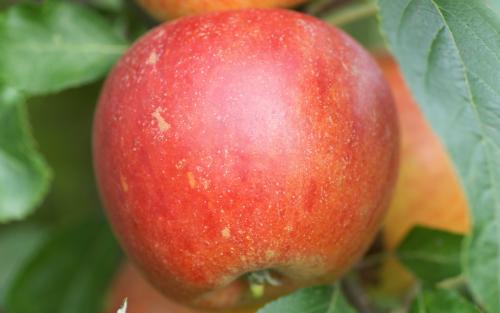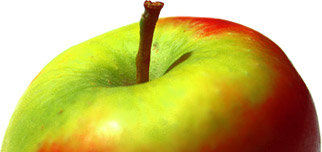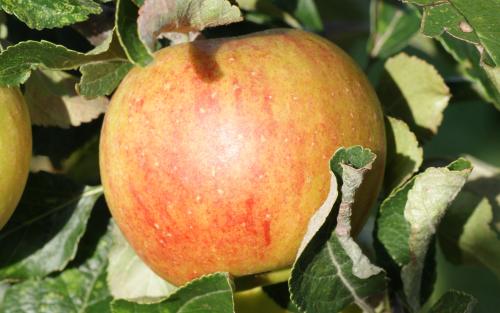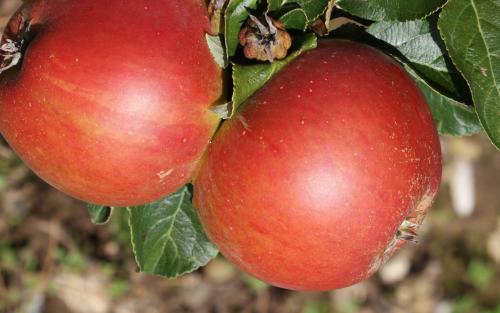Queen Cox apple

Queen Cox is a self-fertile sport (or possibly self-fertile seedling) of Cox's Orange Pippin. It has a slightly improved coloration, and the flavour is just as good as the original.
Anecdotal evidence suggests that it is a bit more reliable than Cox's Orange Pippin - though this is still a very challenging variety to grow.
There appear to be two forms of Cox going under the name Queen Cox, although they may be related. The first form, which is referenced at the UK National Fruit Collection, comes from a natural bud-sport of Cox's Orange Pippin which was found in an orchard in Berkshire, England, in the 1950s. This form is not self-fertile.
The second form was developed at the Long Ashton research station near Bristol, England, in the 1970s and sometimes known as Cox SF18 - presumably the 18th seedling in the development programme The focus of this development was to raise an improved self-fertile Cox - and this form is indeed self-fertile. It is possible that the Long Ashton development used scion material derived from the Berkshire form.
Queen Cox apple identification images
All images copyright Orange Pippin unless otherwise stated.
USDA identification images for Queen Cox
The identification paintings in the USDA Pomological Watercolor Collection span the years 1886 to 1942.
Citation: U.S. Department of Agriculture Pomological Watercolor Collection. Rare and Special Collections, National Agricultural Library, Beltsville, MD 20705.
Sport
This variety is a sport (natural genetic mutation) of: Cox's Orange Pippin
Visitor reviews
- 08 Sep 2022 Trev wQuite tart with a wonderful crunch! My tree has now been in the ground for 5 years and is producing a good crop of this delicious apple. Very happy with it.
- 09 Mar 2022 Becky PippinGEORGIA, United StatesI HAVE IT! and a lot of others.
- 18 Sep 2018 DavidWA, United StatesWill have to seek this in a congenial climate, because so many rave about it (COP and this bud sport). The tree dies in the extreme heat and arid situation here. I refrained from rating its flavor, because those tried here were dreadful, but this is far from England!
- 22 Oct 2013 Josh CockettKENT, United KingdomThere's not much I like more than a Queens Cox in my mouth!
Tree register
United States
- Albany Appleguy in Castleton, NY
- Brian Pruiett in CARLSBORG, WA
- Dan Vorhis in FREELAND, WA
- Glenn Grossman in Vancouver, WASHINGTON
- Jim Gana in Hallstead, PA
- Jim Vandegriff in Trinidad, CA
- Jim Vandegriff in Trinidad, CA
- Scott McElhaney in Camas, WASHINGTON
- Tom Scampoli in NORTH PROVIDENCE, RHODE ISLAND
United Kingdom
- Christine Bradley in LEICESTER, LEICESTERSHIRE
- Dan Smyth in Ilkley, WEST YORKSHIRE
- Darren Pearson in Gloucester, GLOUCESTERSHIRE
- David in Hereford,
- Douglas Silverstone in Chesham, BUCKS
- Graham Bell in Coldstream, BERWICKSHIRE
- Henryc in Andover, HAMPSHIRE
- Ivor Kiverstein in Pulborough, WEST SUSSEX
- Jean Lippett in Martock, SOMERSET
- Jeff in Leicester,
- John Dench in Etchingham, EAST SUSSEX
- John Ellis in Salisbury, WILTSHIRE
- Jon Drakes in Keelby, LINCOLNSHIRE
- Keat Lee in Bristol, AVON
- Mark Sheard in Leyburn, NORTH YORKS
- Mary Phillips in Winchester, HAMPSHIRE
- Nicola Palmer in BRISTOL, BRISTOL
- Philip Wray in Andover, HAMPSHIRE
- Robert Waterhouse in Crediton, DEVON
- Sam Paechter in Leeds, WEST YORKSHIRE
- Vincent Bentley in Montgomery, POWYS
Canada
- Clive Rose in SALT SPRING ISLAND, BRITISH COLUMBIA
Spring blossom records for this variety
2022 season
- 12th May 2022 - tree owned by Jim in Hallstead, United States
2021 season
- 7th May 2021 - tree owned by Jim in Hallstead, United States
2020 season
- 20th May 2020 - tree owned by Jim in Hallstead, United States
2019 season
- 14th May 2019 - tree owned by Jim in Hallstead, United States
2014 season
- 12th May 2014 - tree owned by Mark in Leyburn, United Kingdom
- April 2014 - tree owned by Jim in Trinidad, United States
2013 season
- 24th May 2013 - tree owned by Jeff in Leicester, United Kingdom
- 24th May 2013 - tree owned by Jean in Martock, United Kingdom
2012 season
- 20th May 2012 - tree owned by Jeff in Leicester, United Kingdom
- May 2012 - tree owned by Graham in Coldstream, United Kingdom
- 23rd April 2012 - tree owned by Keat in Bristol, United Kingdom
2011 season
- 24th April 2011 - tree owned by Jeff in Leicester, United Kingdom
- 17th April 2011 - tree owned by Jon in Keelby, United Kingdom
2010 season
- 16th May 2010 - tree owned by Jon in Keelby, United Kingdom
Record your blossom dates in our Fruit Tree Register - more >>.
Harvest records for this variety
2022 season
- 2nd week September 2022 - tree owned by Jim in Hallstead, United States
2021 season
- 4th week September 2021 - tree owned by Jim in Hallstead, United States
2016 season
- 2nd week October 2016 - tree owned by Dan in Ilkley, United Kingdom
2015 season
- 3rd week September 2015 - tree owned by Jim in Trinidad, United States
2014 season
- 4th week August 2014 - tree owned by Jim in Trinidad, United States
2012 season
Origins
- Species: Malus domestica - Apple
- Parentage: A sport of Cox's Orange Pippin
- Originates from: Bristol, England, United Kingdom
- Introduced: 1975
- Developed by: Long Ashton Research Station
- UK National Fruit Collection accession: 1976-148
Identification
- Country of origin: United Kingdom
- Period of origin: 1950 - 1999
- Fruit colour: Orange / Red
- Flower colour: White
- Leaf colour: Green
- Popularity: Under-rated
- Annual cycle: Deciduous
- Alleles: 5
- Alleles: 9
Using
- Picking season: Mid
- Keeping (of fruit): 1-2 months
- Flavour quality: Exceptional
- Flavour style (apples): Aromatic
- Discoloration of fruit: Slightly oxidising (browns slowly)
- Vitamin C content: Medium
- Cropping: Light
- Fruit persistence: Normal ripening
- Food uses: Eating fresh
- Food uses: Culinary
- Food uses: Juice
- Picking period: mid-September
- Wildlife: RHS Plants for Pollinators
Growing
- Gardening skill: Experienced
- Flowering group: 3
- Pollinating others: Poor
- Ploidy: Diploid
- Vigour: Weak growing
- Precocity: Precocious
- Bearing regularity: Regular
- Fruit bearing: Spur-bearer
- Self-fertility: Self-fertile
Climate
- Frost resistance of blossom: Susceptible
- Climate suitability: Temperate climates
- Summer average maximum temperatures: Cool ( 20-24C / 68-75F)
Other qualities
- Disease resistance: Poor
- Canker: Some susceptibility
- Scab (Apple and Pear): Some susceptibility
- Powdery mildew: Some susceptibility
- Cedar apple rust: Some susceptibility
Where to buy trees
The following tree nurseries offer Queen Cox apple trees for sale:
- Orange Pippin Fruit Trees (USA) United States
Cox Queen apple trees - Orange Pippin Fruit Trees (UK) United Kingdom
Queen Cox apple trees
Where to buy fresh fruit
The following orchards grow Queen Cox:
United States
Maine
- Tiny Orchards, Saco
Washington
- Skipley Farm, Snohomish *** Feature Orchard ***
United Kingdom
England - midlands
- Walsgrove Farm, Worcester
England - south-east
- Kimpton Manor Apple Press, Andover
Canada
British Columbia
- Dragonfly Farm, Salt Spring Island



